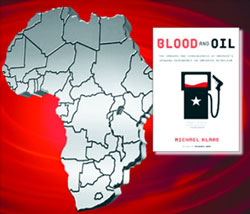FCNNEWSSOURCE

While oil production is declining in many parts of the world, in Africa it is increasing. That and other resources make Africa a new frontier for the U.S., Europe and emerging powers like China and India. Will the competition for African resources produce conflict or new opportunities for cooperation? Michael Klare, professor of Peace and World Security Studies at Hampshire College in Massachusetts is the author of, most recently, “Blood and Oil: The Dangers and Consequences of America’s Growing Dependency on Imported Petroleum.” He was interviewed by Brian Shott, an editor at New America Media.
New America Media (NAM): Why are we hearing so much about Africa’s natural resources lately?
Michael Klare (MK): Because Africa is one of the areas of the globe where the competition for the world’s diminishing resources is most intense. Many of the other areas are in somebody’s sphere of influence. Africa is less so, and therefore it’s more of a competitive field.
NAM: And oil is the main resource the major powers are after in Africa?
MK: Yes, but hardly the only one. China, for example, is the world’s largest user of copper, iron ore, chromium and cobalt, and a lot these minerals are highly concentrated in Africa.
NAM: China describes its aid as “condition-less” and based on “non-interference in African affairs.” Is this good or bad for Africa?
MK: On the positive side, China is pouring in a certain amount of money to help Africa develop its infrastructure. They’re building railroads and highways and you need that infrastructure to develop. The U.S. and the Europeans did that when Africa was part of the U.S.-Soviet competition, but not anymore. China is also providing valuable teacher and medical personnel training.
On the other hand, China looks the other way at corruption and bribery and that’s not good for Africa. That China turns a blind eye to human rights abuses is also not a good thing for Africa. In the long run, that stifles development too.
NAM: Is the conflict in Darfur about natural resources other than oil?
MK: Yes, and it’s a resource war on many levels. Locally, it’s a product of the tragedy of the 21st century in poor countries: There’s too many people, not enough land, not enough water to support populations, and so they’re struggling between themselves. Unfortunately, these struggles for land and water often seem to take the form of an ethnic or religious conflict, but in reality, it’s desperate people on both sides, desperate for land and water–land to grow food or to raise animals.
In Darfur, in the area around the Sahara you have cattle grazers or pastoralists, intruding on the land of farmers or agriculturalists. This is because the Sahara is expanding due to desertification, accelerated by global warming.
The pastoralists are, in many cases, Muslims and Arabs. In the case of Darfur, all the groups are Muslim, but they’re ethnically different. So global warming and population growth and diminished resources exacerbate divisions along ethnic lines and producing ethnic wars that are, at root, resource conflicts. Then, Sudan is becoming an oil producer that is closely tied to China. Other countries also want access to Sudan’s oil. China is serving as Sudan’s protector in the UN Security Council, and acting to deflect the other Security Council countries from imposing harsh sanctions on the Sudanese government over Darfur. If China joins the other countries, it risks jeopardizing its privileged oil position in the Sudan.
So you have two interconnected resource conflicts in the Sudan. Oil on one level, and land/water on the other.
NAM: Why is Africa so attractive to the U.S. in terms of oil?
MK: Africa is on a forward curve in terms of oil production, one of the few places where this is so. This is absolutely critical, because much of the rest of the world is on a downward production curve. Many older oil fields, like in Mexico and the U.S., are in decline. What makes Africa really appealing is that a lot of the most promising oil fields are offshore. This just lights up the eyes of American oil men, for two reasons.
One is that they’re the world leaders in the technology necessary to extract deep, offshore oil. Nigeria, Angola, Equatorial Guinea do not possess this technology and know-how, so they have to offer partnerships to the American companies and the Europeans. It’s different in Saudi Arabia, Iran or Iraq, because the oil is not below the ocean and they’ve mastered that technology. They don’t need the Americans as much. But the Africans do. The Chinese companies are also not up to speed on these technologies.
Second, you don’t have to worry about terrorists or guerillas when you’re 100 miles offshore. The U.S. has developed these drilling rigs that are like floating cities. They contain storage facilities, dormitories, docks. So they pump for oil, fill their onboard storage facilities and the tankers get pumped with the crude and go back to Houston. Nobody ever touches the soil of Africa.
NAM: What about Chinese complicity in the tragedy in Darfur?
MK: I think we’ve given China the impression that it’s not welcome in places where America has long had an advantage. Historically, the U.S. has given China the signal that it’s not welcome as an equal player. This has driven China to take advantage in the only places they can, like the Sudan and Iran. That’s bad for us in the long run. Better to open the doors to China in the places where that isn’t a danger. But I don’t think the African masses are going to benefit from this investment in oil and energy, and that’s the tragedy in all of this. Because basically, what all these countries want is to extract the resources of Africa to serve their economies. They’re not really interested in promoting the broad-based economic development of Africa, no matter what they say.












